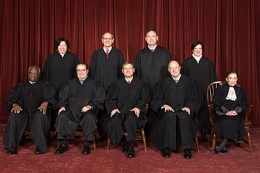Do Supreme Court decisions have an immediate effect on your life?

You may be wondering what this means. If the Supreme Court decides a case and issues a ruling, isn’t that the law of the land from that day on? Were it not for the human factor, that would be true. But since individual judges are involved and many other factors come into play, just because the Supreme Court states that something is right or wrong doesn’t necessarily mean that’s the way it will be without further action. We present a few examples below to explain what this is about.
Consider the case of Savana Redding, a 13-year-old Arizona girl who was strip-searched at school because another student said she obtained ibuprofen from Savana. This happened in 2003 and it took six years before the Supreme Court threw out the search as unconstitutional in the strongest words possible. As Savana’s case made its way through the courts, one federal judge commented “It does not take a constitutional scholar to conclude that a nude search of a 13-year-old girl is an invasion of constitutional rights. More than that: it is a violation of any known principle of human dignity.” (emphasis added by ATJ.info) The Supreme Court ruled in Savana’s favor in 2009.
Then, a few months later, five teenage girls at an Iowa high school were strip-searched at school for a reported $100 in cash missing from gym class. The matter was investigated and the school was brought up to speed regarding the Supreme Court’s ruling in Savana’s case.

U.S. Supreme Court
Another example involves biracial marriage. Some states prohibited such under penalty of law. This was the case in Virginia in the 1950s. When a black woman, Mildred Jeter married Richard Loving, a white man, they were prosecuted and convicted of violating the state’s law against biracial marriage. In 1967, the Supreme Court reversed the conviction stating that marriage is one of the “basic civil rights of man fundamental to our very existence and survival. . . .Under our Constitution, the freedom to marry, or not marry, a person of another race resides with the individual and cannot be infringed by the State.” This didn’t stop a justice of the peace in 2009 in Louisiana from refusing to marry a biracial couple. He didn’t believe in a mixing of races and was concerned about the future of their children. The couple found a judge who would marry them and Justice of the Peace Keith Bardwell resigned under pressure the following month.
The point here is that it takes time, effort and persistence to enforce the law whether passed by a legislature or by order of a court. Someone must point out the discrepancies between what the law says and reality in one’s daily life. Just because the Supreme Court threw out separate-but-equal education in 1954 (Brown v. Board of Education) didn’t mean it ended that year. It took years and numerous challenges to enforce the decision from the Court.
When the issue is about imminent harm to someone or ending their life, the legal system does provide for immediate relief. Since the Supreme Court ruled the death penalty for juveniles unconstitutional in 2005, for example, if a minor was sentenced to death today, a court would act immediately and follow the law of the land. In cases of lesser consequence, it takes time to resolve the matter.
 An issue that may affect your life involves the use of social media. You may be disciplined at school for a post you made on Facebook or Twitter. If you challenge it in court, it could take several years for the issues to be resolved. In the meantime, you may have to comply with the consequence. Courts are unable for a number of reasons, not the least of which is volume of cases and due process for all parties to the case, to decide your challenge to the discipline as quick as you’d like. So, although court rulings affect lives, the immediate consequences may be felt over a period of time.
An issue that may affect your life involves the use of social media. You may be disciplined at school for a post you made on Facebook or Twitter. If you challenge it in court, it could take several years for the issues to be resolved. In the meantime, you may have to comply with the consequence. Courts are unable for a number of reasons, not the least of which is volume of cases and due process for all parties to the case, to decide your challenge to the discipline as quick as you’d like. So, although court rulings affect lives, the immediate consequences may be felt over a period of time.



when do supreme court decisions go into effect i.e. agency shop which was just decided today 6/27/18
Dear John: Unless the court indicates an effective date for its decision, which it rarely does, it goes into effect immediately. Depending on the facts of the case, however, there may be no immediate effect if, for example, they send the case back to the lower court for additional consideration. Good question – thanks.
(This is information only – not legal advice).